Bessie Blu-ray Movie
HomeBessie Blu-ray Movie 
Blu-ray + UV Digital CopyHBO | 2015 | 112 min | Rated TV-MA | Sep 01, 2015
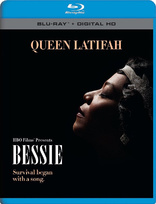
Movie rating
6.3 | / 10 |
Blu-ray rating
| Users | 0.0 | |
| Reviewer | 4.0 | |
| Overall | 4.0 |
Overview
Bessie (2015)
BESSIE focuses on the transformation of a struggling young singer into the "Empress of the Blues," one of the most successful and influential recording artists of the 1920s. Capturing Bessie Smith's professional and personal highs and lows, the film paints a portrait of a tenacious spirit who, despite her demons, became a legend.
Starring: Queen Latifah, Michael Kenneth Williams, Khandi Alexander, Tika Sumpter, Tory KittlesDirector: Dee Rees
| Music | 100% |
| Biography | 14% |
| Drama | Insignificant |
| History | Insignificant |
Specifications
Video
Video codec: MPEG-4 AVC
Video resolution: 1080p
Aspect ratio: 1.78:1
Original aspect ratio: 1.78:1
Audio
English: DTS-HD Master Audio 5.1 (48kHz, 24-bit)
French: DTS 5.1
Spanish: DTS 2.0
Subtitles
English SDH, French, Spanish
Discs
50GB Blu-ray Disc
Single disc (1 BD)
UV digital copy
Playback
Region A, B (C untested)
Review
Rating summary
| Movie | 4.0 | |
| Video | 4.5 | |
| Audio | 4.5 | |
| Extras | 1.5 | |
| Overall | 4.0 |
Bessie Blu-ray Movie Review
Her Way
Reviewed by Michael Reuben September 17, 2015HBO's bio-pic of blues legend Bessie Smith took twenty years to make, but Queen Latifah was always the producers' first choice for the title role, even as the script was rewritten and directors came and went. As proof, the short feature on the making of the film includes excerpts from Latifah's blurry VHS audition in 1996, where it was already clear that then-26-year-old singer had the screen presence to play the dynamic performer dubbed "The Empress of the Blues". What the star picked up in the intervening decades, as she says herself in interviews, was the life experience to fill out the entirety of Smith's character. By the time Bessie began filming, Latifah had already lived longer than Smith, who died in a car accident at the age of 43. The original script for Bessie was principally written by Horton Foote, one of America's great playwrights and the two-time Oscar-winning screenwriter of To Kill a Mockingbird and Tender Mercies. The influence of Foote, who died in 2009 but retains a story credit on the finished film, can still be seen in its laser-sharp focus on the effect of money on relationships and the sense of how family history accompanies a person throughout life. The final script is credited to Bettina Gilois (McFarland, USA) and director Dee Rees (Pariah), whose strong vision for the film so impressed the producers that they gave her the assignment despite her short résumé. Rees proceeded to break with the conventional show business bio-pic, in which the artist's first-act struggles to achieve success are followed, in the second act, by a personal crisis caused by inner demons and expressed through drugs, alcohol, infidelity, psychological problems, broken relationships and/or whatever else can be drawn from the subject's life. Depending on the facts, the third act is either a final decline or a renewal and second chance. Bessie takes a different approach. The struggle to succeed and the inner demons go hand-in-hand; indeed, one of the underlying themes throughout Bessie is that inner demons are part of the essential equipment for establishing the connection with an audience that elevates a blues singer to the first rank. Hopping smoothly among locations as Smith travels the vaudeville circuit, and slipping almost imperceptibly between an objective third-party view of events and Smith's intensely emotional subjective view—a technique borrowed from Olivier Dahan's portrait of Édith Piaf in La Vie en Rose—Rees and Latifah present a nuanced portrait of a complex and contradictory woman: vulnerable and strong-willed, approachable and remote, needy and giving, generous and withholding. Everything about Bessie Smith was extreme, including her talent.
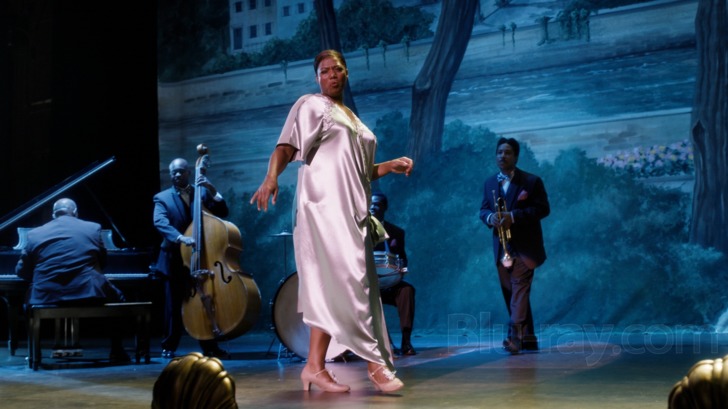
Bessie opens in 1927 in Philadelphia, when Smith (Queen Latifah) is already a star standing on stage basking in the thunderous glow of the cheering audience. But Rees shoots the scene surreally. The camera angles are disorienting, the colors oversaturated, and as Bessie leaves the performance to return home, the camera isolates her in the frame, even when she is surrounded by people. Thus, Rees establishes both a style and a theme to which Bessie will repeatedly return, as it explores how the singer routinely distances herself from others, sometimes inadvertently but often deliberately. Winding back fourteen years to 1913, we see Bessie as a struggling vaudevillian in Atlanta managed by her brother, Clarence (Tory Kittles), who talks her way into a kind of apprenticeship with established star Ma Rainey (Mo'Nique). Although some liberties have been taken with the facts (the history of this era in vaudeville is imperfectly documented), it is generally agreed that Rainey was an important influence on Smith's stage manner, if not her singing, and these early scenes crackle with the intensity of two major talents recognizing (and competing with) each other. After some years, Smith's reputation has grown to the point where she feels able to strike out on her own. Bessie has many fine musical performances, all of them backed by a deep bench of players from the local music scene in Atlanta, Georgia, where the production was headquartered. The film also provides authentic glimpses into the structure of the era's entertainment business, much of which was controlled by the Theater Owners' Entertainment Association, and into the early efforts of major record labels like Columbia to find a way to capitalize on this new phenomenon called "the blues". But Bessie's most memorable scenes involve her complicated personal life, in which she seemed torn by conflicting impulses. On the one hand, she urgently sought emotional connection with others, pursuing sexual relationships with both men and women, and eventually adopting a son. But on the other hand, she always found ways to keep people at arm's length, perhaps because her childhood memories of family were so painful that she couldn't bear to let anyone get close to her again. Rees periodically inserts fragments of Bessie's childhood memories, which are not of anything horrific or shameful but merely reflect the terror and sadness of a little girl who had lost both parents by the age of 9. Raised by her stern older sister, Viola (Khandi Alexander), Bessie remembers childhood as a time of privation and Viola as the ogre depriving her. When the two reunite in the film's latter half, it is less a reconciliation than a recognition that blood is forever. It is Bessie's husband, Jack Gee (Michael Kenneth Williams, who played Omar in The Wire), who objects the loudest to the sisters' reunion, because he understands how delicately balanced his marriage to Bessie really is. (It ends badly because of infidelity on both sides.) Bessie's two most loyal loves are her girlfriend, Lucille (Tika Sumpter), and her bootlegger (as she calls him), Richard Morgan (Mike Epps), but Lucille eventually moves on to have a full life of her own with a husband, and Richard cannot settle for a casual relationship built on selling home-brewed corn liquor to the woman he loves. Both of them disappear, and when Bessie's career stalls in the Depression, and her finances fail, it is brother Clarence who stands by her. (Morgan does eventually return.) In Rees's film, however, every reversal or setback becomes more creative fuel for Smith's artistic expression. Her chief obstacles are less her own demons than the social divisions that limit her audience, which exist even among the supposedly enlightened intellectuals of the New York literary society. (A scene featuring Oliver Platt as writer and photographer Carl Van Vechten is positively painful.) A sequence near the film's end suggests that Columbia Records was interested in promoting Smith as a singer for the budding era of "swing" music, and in fact she did make several recordings for them in 1933 with the players noted in the scene (although the film somewhat overstates Benny Goodman's role). By that time, however, Columbia was much more interested in a rising young star known as Billie Holiday, who counted Bessie Smith among her greatest influences. Still, if not for the fateful car accident in 1937, who knows what further accomplishments Smith might have managed? As she says at the end of the film, "I do wanna know what's over that next hill, round that next corner."
Bessie Blu-ray Movie, Video Quality 
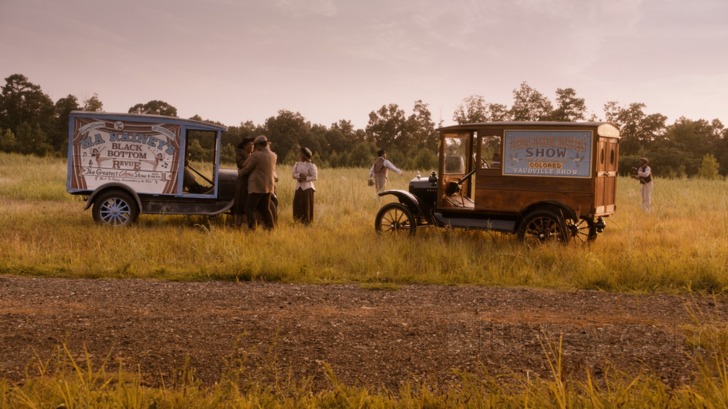
Bessie was shot with the Arri Alexa by Jeff Jur, whose credits range from Dirty Dancing to the last two seasons of Showtime's Dexter. In the featurette included in the extras, Jur says that Rees constantly pushed him in new directions. Although he doesn't give specifics, it is certainly the case that Bessie doesn't look anything like the typical historical film, where desaturated colors and a golden glow are often used to convey the sense of a bygone era. Instead, the cinematography is bold and bright, the better to place the viewer in Bessie's era as it was: vital, vibrant and exciting. Much of Bessie Smith's success overlapped the Roaring Twenties, an era of prosperity and high living, despite (or because of) Prohibition. In production design, costumes, makeup and cinematography, Bessie attempts to convey the excitement of its time, especially from its title character's point of view. HBO's 1080p, AVC-encoded Blu-ray was presumably sourced by a direct digital path from the digital intermediate on which post-production was completed (including digital effects to remove any vestige of modernity from locations). The image is superb, with solid blacks, excellent detail and no noise or interference. Colors range from naturalistic (e.g., the scenes of bread lines during the Depression) to the bold and intense hues of the nightclubs and stages where Bessie performs. The notable exception is the flashback cuts to Bessie's childhood, which are deliberately desaturated and slightly blurred, to create a sharp contrast with the present-day sequences. HBO has mastered Bessie with an average bitrate of 30.99 Mbps, which is excellent for digitally originated material, and the compression has been capably performed.
Bessie Blu-ray Movie, Audio Quality 
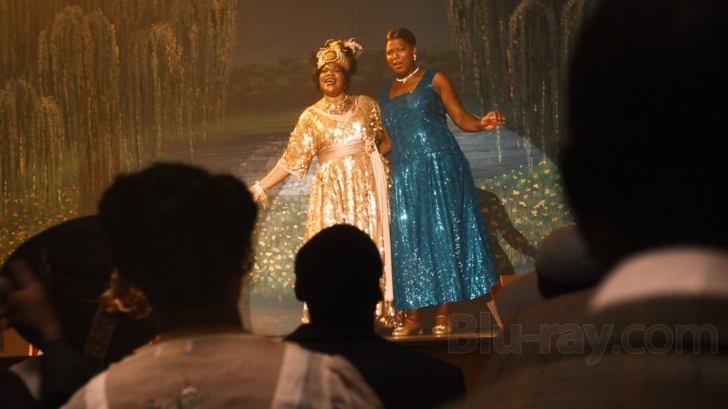
Bessie's 5.1 audio mix, presented in resounding, lossless DTS-HD MA, is a revealing experience. As explained by music supervisor Evyen Klean, one of the soundtrack's goals was to recreate Bessie Smith's music as if the viewer were able to hear it "back in the day" instead of on a limited selection of scratchy vintage recordings. To that end, the instruments have been recorded with a care and a dynamic range that lets the bass notes and drumbeats vibrate through you as if you were sitting in a tiny club or an outdoors revival tent, with the musicians performing nearby and the singer projecting at the audience (a technique explained to Bessie by Mo'Nique's Ma Rainey in an early scene). The dramatic scenes are equally clear, in the manner we have come to expect from contemporary 5.1 mixes. Rachel Portman has supplied period-appropriate underscoring that blends smoothly with the blues and jazz standards being recreated by the talented musicians playing throughout the film, as well as the occasional original recording, such as Louis Armstrong performing "Black and Blue".
Bessie Blu-ray Movie, Special Features and Extras 
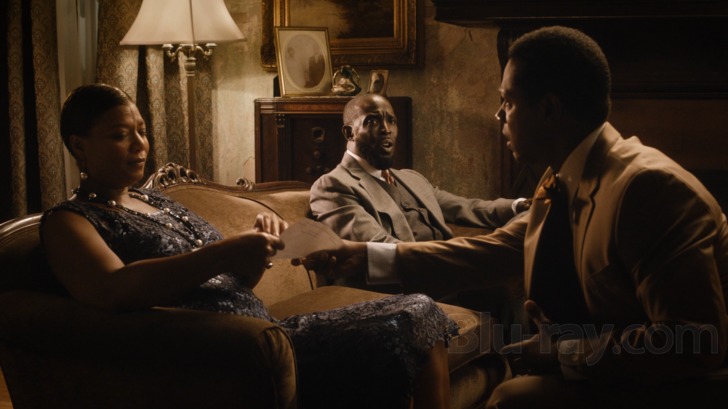
- Bessie: A Creative Journey (1080p; 1.78:1; 18:35): With interviews from producer Lili Fini Zanuck, writer/director Dee Rees and most of the principal cast and crew, this featurette provides a solid overview of the making of Bessie, dating back to the first script and the star's initial audition.
- Filming in Georgia (1080p; 1.78:1; 3:43): This short love letter to the State of Atlanta and City of Georgia recycles excerpts of interviews from the main featurette but also adds a few new ones. It concludes with a thank-you from Queen Latifah.
Bessie Blu-ray Movie, Overall Score and Recommendation 
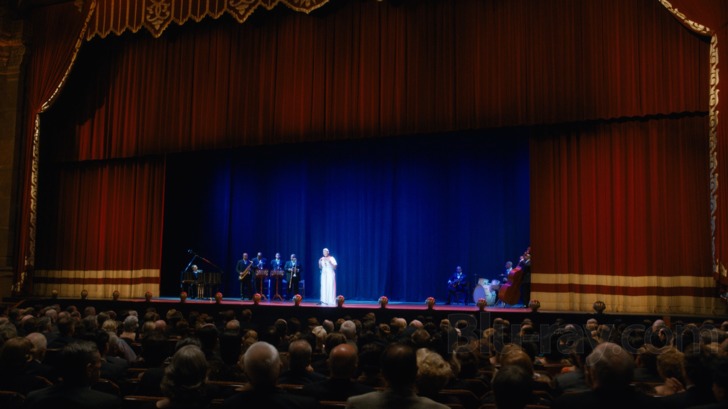
Neither a "message" film nor a conventional show business biography, Bessie is a fascinating portrait of an American original, a musician whose influence has been so thoroughly absorbed into popular culture that its extent can no longer be calculated. Historians can debate the details, but the portrayal is so compelling that it should bring Bessie Smith to the attention of a whole new generation, just as Lady Sings the Blues did for Billie Holliday. Highly recommended.
Similar titles
Similar titles you might also like
(Still not reliable for this title)

Get on Up
2014

Bird
1988

I Saw the Light
2015

The Doors
1991

Ray
2004

The Cotton Club Encore
1984

All Eyez on Me
2017

Whitney
2018

The Buddy Holly Story
Limited Edition to 3000 - SOLD OUT
1978

Nowhere Boy
2009

Miles Ahead
2015

Respect
2021

Shine
1996

Love & Mercy
2014

La Bamba
1987

Bohemian Rhapsody
2018

Judy
2019

Eric Clapton's Crossroads Guitar Festival 2010
2004-2013

Green Day: Bullet in a Bible
2005

Cadillac Records
2008